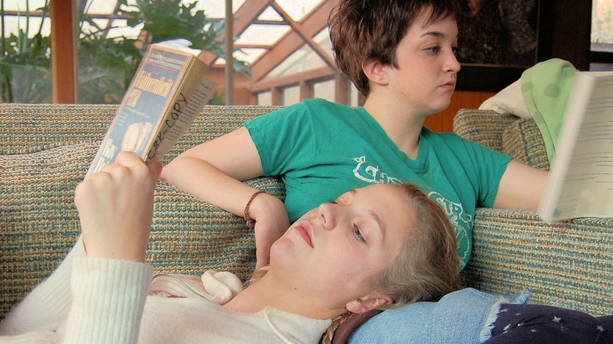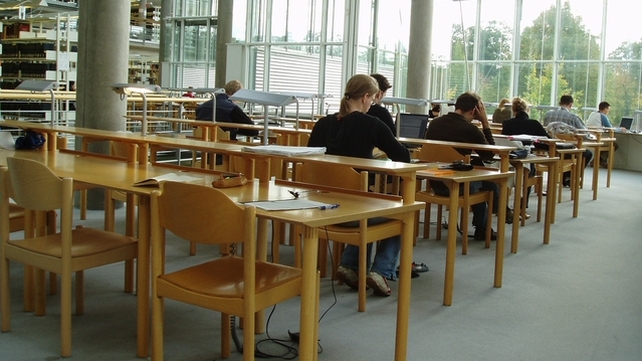Our annual week of blue skies and soaring temperatures is here and that can only mean one thing for Ireland’s teenagers: Exams.
Why do the sun gods do this to us? Every single year.
Ok, so this is the situation your children are in. The sun is splitting the stones but there’s no getting around it – they’ve got to study.
Luckily, RTÉ Lifestyle is on hand to help. We’ve searched reports and studies for the best advice to help your child through this stressful time. We’ve also asked the experts: the teachers and the guidance counsellors. Hopefully, some of this advice will help you to help your child manage their time and use effective study methods. Moreover, we have top tips on how to help them avoid stress and exam burnout. Who knows, they might even get a chance to spend some time in the sun.
Orla Ni Shuilleabhain, study skills expert at The Institute of Education, has this advice for students:
Okay, so the exams are next week and you should now have two main goals. Firstly, you want to do as well as you possibly can. Secondly, you ideally want to get through the exams with the minimum amount of stress and anxiety.
Orla cites time management, prioritising and getting lots of fresh air during study breaks to help with getting through what might seem like a mammoth workload.
She also has some advice for students who might be stuck on a particular topic that us parents may not be able to recall from our own school days, or that we may not have studied at all. For example, many parents of school-going children in Ireland today didn’t grow up speaking Irish. “If you’re confused about any aspect of the upcoming exams, go to the expert in the field: your teacher,” says Orla.
Some students worry that they may not be able to approach their teacher about upcoming exams. A good idea might be to reassure them that their teacher actually wants them to do well in their exams and will be happy to help them.
John Devine, a teacher at St. Paul’s College in Raheny, Dublin, agrees. “Pupils should ask their teachers if they need help,” he told RTÉ Lifestyle. “99 per cent of teachers are happy and willing to help their pupils. They've probably gone through the course inside and out and are - given they know their pupils and the stress they are under - arguably the best people to ask.”

So, when it gets down to the nitty-gritty of actually learning the curriculum, what advice can you give to your child when they ask you what they should study, or indeed how they should study?
“Unfortunately, our education system is geared around results in a set of exams,” says John. “Not all pupils learn the same way but in most cases are given the same time and resources to complete an exam. Pupils with learning disabilities are catered for in a lot of cases but the Junior and Leaving Certificates can still be very tough for many students, even with allowances.
“I will often hold up a geography book at the start of 6th year to my students and say, ‘you can't possibly write down everything in this book in two to three hours. Even if you had the book in front of you it's near impossible. But the good news is, we don't have to learn everything in this book. We have to learn how to do well in an exam that lasts two to three hours.’
“Pupils can do this by simply practicing exam questions and timing themselves. If they were training for a soccer game they'd practice the same skills over and over and apply them to a 90 minute game. The exact same principal applies in exams. There’s no point in typing your homework if you're going to be writing in the exam. The more they practice, the more their confidence will grow.
“Little tips like reading an answer aloud and recording it on their phone helps. Listening to it back again a few times commits it to memory in a different way from just reading it. It's their very own podcast. Also, sites like You Tube are littered with short lectures on certain topics a pupil will be studying. Some are better than others but often topics are taught concisely and have the advantage of being visual. These are a good way to formulate initial understanding of a subject. Websites should only be used for purpose, though, and not as the only studying tools. Oftentimes pupils will get distracted. Parents may want to monitor use.”
With John’s tips in mind, here are the numbers that tell us why it’s so important to help our children cultivate effective study methods that help them actually process the information. (If your children are anything like mine, study time consists of writing almost every statement in the book on to flash cards and highlighting sporadic words in different colours!)
According to Learning to Learn: A Parent’s Guide, published by The Institute Of Guidance Counsellors and available to download free online, research shows that we remember 20% of what we read, 30% of what we hear, 40% of what we see, 50% of what we say and 60% of what we do.
However, we remember 90% of what we read, hear, say and do at the same time.
“In other words,” states the guide, “use as many senses as possible when learning i.e. read, think, write, say and hear.”
“Exactly,” agrees John. “Completing homework and understanding it are two very different things. When possible, guardians might check the understanding of homework rather than the completion. This gets pupils to think in a different way and engage with a subject rather than just 'get through it'.

So, even with an arsenal of study tips to help your child get through the next couple of weeks, there’s the added pressure of keeping them focused and calm throughout the exam period.
Orla Ni Shuilleabhain has some simple, but very important, advice:
- Plan your study breaks
“Don’t try to study non-stop for days on end,” says Orla. “You’ll get sick of it quickly, and you’ll be too burnt-out to do well in the exams. When you create your schedule, include short study breaks to help you relax and come back fresh. Not only will you feel better, but your concentration and level of learning will be much higher.”
- Make sure to get some exercise
“Otherwise you’ll have low energy levels which will really impact on your studies. Short, stress-relieving activities, like a workout or run, are best. Just don’t overdo it.”
- Make sure you sleep
“No one can function at their best with a lack of sleep. You’ll do much better during exams if your mental state is good, and sleep is essential for this.”
Maybe that last one is something us parents could pay heed to. “Parents need a break too,” says John, who has three children of his own. “You don't want to sound like a broken record urging your kids to study, study, study 24/7. In an age when we are acutely more aware of mental health issues than previous generations, we want our pupils/kids to be as healthy and happy as possible. An impromptu movie night, cinema trip or whatever, goes a long way. It gives both parties a bit of down time and - above all - perspective.”
Helping your child to keep it all in perspective and not get too anxious is important. “Excessive stress will make students upset and impact on their performance,” says Orla. She advises that parents or guardians who are concerned about their child’s stress levels encourage them to share their worries with someone – be it a friend, parent or school guidance counsellor.
Orla Ni Shuilleabhain will be holding a number of study skills seminars in The Institute of Education in the autumn. These seminars teach students how to develop good study techniques and advise them on how to make the best possible use of their revision time. For more information visit: www.instituteofeducation.ie
John Devine teaches at St. Paul’s College in Raheny, Dublin. For more information visit: www.stpaulscollege.ie
Learning to Learn: A Parent’s Guide, published by The Institute Of Guidance Counsellors,is available to download free online here: http://www.igc.ie/download/1/documents/For%20Students/STUDY-LEARNING-TO-LEARN.pdf
Some other great study resources:
Past papers, sample answers and marking system information
Award-winning maths tutorial website
Social learning platform with great resources
Official portal for Irish education
If you have any study tips you’d like to share with parents or students, please tweet them to Twitter @LifestyleRTE.


